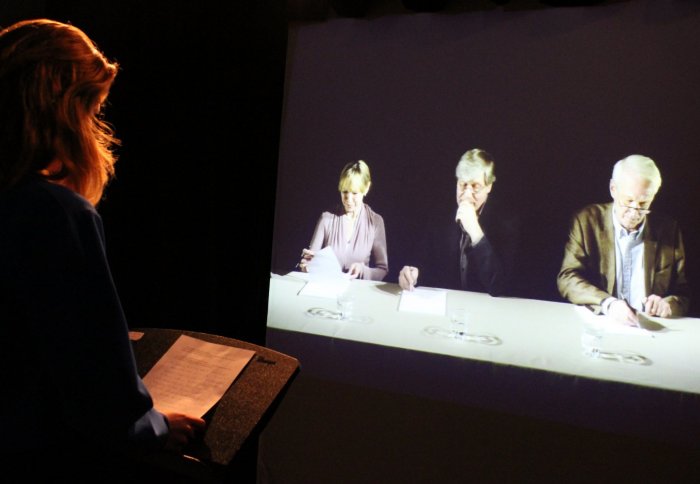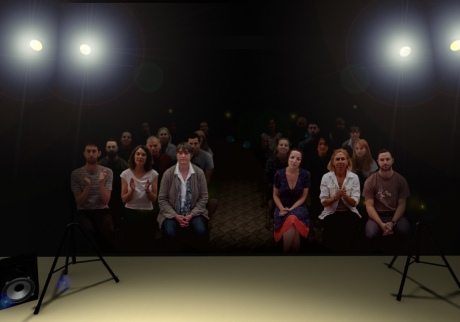New virtual audience simulator helps people perform better in public

Christel Wolthoorn, Head of Strategic Engagement, Digital and Innovation with KPMG UK tests her public speaking with the simulator.
People can try a virtual reality simulator, designed to help professionals perform well in front of an audience, at this weekend's Imperial Festival.
“Public speaking is an essential skill for people at all levels in business, whether you are chairing an internal meeting or presenting a pitch to a client. The simulator allows people to improve their confidence by taking risks in a safe environment.
– Beate Baldwin
Head of Open Enrolment Programmes and Marketing, Imperial College Business School
The Performance Simulator was developed by the Royal College of Music and is currently used as a training facility to help musicians overcome their fear of performing in front of a live audience.
Featuring an on-stage and back-stage area and a virtual reality audience, the simulator helps manage the stress of performing in front of large groups of people by recreating the conditions of a concert hall or audition room. Participants step into an enclosed area and perform to a virtual audience projected on a large screen.
A pop-up version of the simulator will be on show at the Imperial Festival on Saturday 9 and Sunday 10 May, where visitors will have a chance to try it out and meet the experts behind it.
The simulator is based at the Royal College of Music’s Centre for Performance Science. From June, it will also be used by Imperial College Business School to help executives to hone their skills in public speaking, as part of the School’s new Executive Education Impact Lab™.
At present, users of the simulator can choose between two settings – concert or audition simulation. The Royal College of Music is now working with Imperial to further develop the simulator and enable professionals from other industries to benefit from the technology.

A view of the performance simulator's virtual audience. Image credit: Royal College of Music
In the concert setting, performers play to a simulated audience who, at the end of a performance, respond by clapping or booing. The audition mode features a panel of three people who invite the participant to perform and thank them once they have finished. The settings are controlled by a computer located outside the simulator and other effects such as an audience member coughing or a mobile phone ringing, can be added to create extra stressors that occur in a real performance situation.
Participants can re-watch and evaluate their performances and track their progress by opting to have their stress levels and heart rate monitored before, during and after using the simulator.
Christel Wolthoorn, Head of Strategic Engagement, Digital and Innovation with KPMG UK tried out the simulator at a preview event this week. She said: “The way in which you deliver a speech is the key to winning over your audience. The simulator allows you to become better at reading the body language of your audience and lets you hone your skills in a safe environment so you are better prepared to face real life challenges.”
Professor Aaron Williamon, Professor of Performance Science, Royal College of Music said: “Stage fright is a very real problem, not just for musicians but for anyone who is required to perform in front of an audience, whether you are a professional musician performing in a concert or a company CEO delivering a keynote speech at a conference.”
He continued: “Our work with the simulator shows that musicians who are given repeated exposure to realistic performance situations can more effectively manage the stresses of performing and the demands of their audiences. You can easily apply this principle to the world of business, which is why we are working with Imperial to develop the simulator to include new settings such as a press conference mode, to enable professionals from other industries to benefit from the technology.”
Beate Baldwin, Head of Open Enrolment Programmes and Marketing, Imperial College Business School said: “Public speaking is an essential skill for people at all levels in business, whether you are chairing an internal meeting or presenting a pitch to a client. The simulator allows people to improve their confidence by taking risks in a safe environment and will be a great addition to our existing labs like the Carbone Capture Lab or the portable operations theatre.
She continued: "Our Impact Lab™ is a unique and experiential approach to Executive Development which takes managers and executives out of their comfort zone by placing them in unfamiliar environments where they can test new ways of thinking and working. ”
In addition to showcasing the performance simulator at the Festival, on Sunday 10 May, Aaron Williamon will join Roger Kneebone, Professor of Surgical Education and Engagement Science for a discussion on how to manage performance anxiety.
Article text (excluding photos or graphics) © Imperial College London.
Photos and graphics subject to third party copyright used with permission or © Imperial College London.
Reporter
Laura Singleton
Communications Division